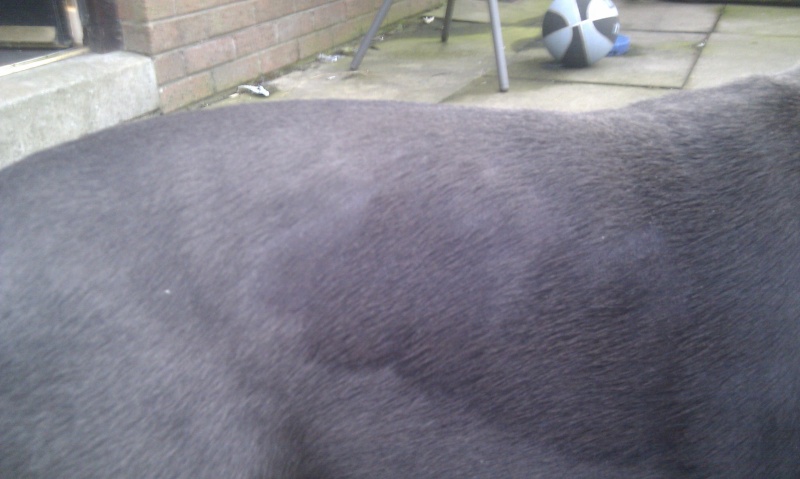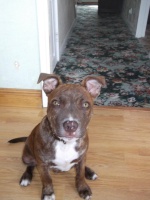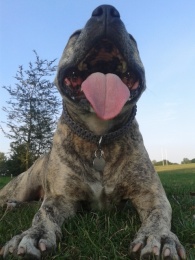colour dilution alopecia
5 posters
Staffordshire bull terrier :: Welcome To www.staffy-bull-terier.niceboard.com :: Feedback, Suggestions & Thanks Forum
Page 1 of 1
 colour dilution alopecia
colour dilution alopecia
related terms: colour mutant alopecia, blue or fawn , fawn Irish setter syndrome, blue dog disease
What is colour dilution alopecia?
This condition develops in some, but not all dogs that have been bred for unusual coat colour, especially "fawn" (a dilution of a normally red or brown coat) or "blue" ( a dilution of the normal black coat colour). Alopecia means hairlessness - affected dogs have a poor, patchy haircoat progressing to widespread permanent hair loss. At the cellular level, there are abnormalities of the hair follicles and uneven clumping of pigment (melanin) granules in the hair shafts in affected areas
How is colour dilution alopecia inherited?
The inheritance is unclear. The condition is thought to be due to the interaction of different factors at the gene position for colour. It is not simply determined by the genes at that locus, because not all dogs with colour dilution develop coat problems.
What breeds are affected by colour dilution alopecia?
This condition is seen most commonly in Doberman pinschers with unusual coat colours (as many as 90% of blue and 75% of fawns). The condition also occurs but is less common in other breeds bred for unusual coat colours: Bernese mountain dog, chihuahua (blue), chow chow (blue), dachshund (blue), Great Dane (blue), Irish setter (fawn), miniature pinscher (blue), saluki, schipperke (blue), Shetland sheepdog (blue), standard poodle (blue), whippet (blue), Yorkshire terrier (grey-blue).
For many breeds and many disorders, the studies to determine the mode of inheritance or the frequency in the breed have not been carried out, or are inconclusive. We have listed breeds for which there is a consensus among those investigating in this field and among veterinary practitioners, that the condition is significant in this breed.
What does colour dilution alopecia mean to your dog & you?
Dogs with this condition are born with a normal haircoat. Those with lighter blue or fawn hair coats usually start to show changes by 6 months while in dogs with darker steel blue coats, the changes may not be evident until 2 or 3 years of age. Your dog will experience hair loss and dry skin. Sometimes the earliest sign is a recurring bacterial infection (folliculitis), generally on the back, where you will see small bumps which are infected hair follicles. This clears up temporarily with antibiotics, but the affected area is very slow to regrow hair, or remains hairless.
Hair loss is usually first apparent on the back and by 2 or 3 years has spread over all the light coloured areas of the body. The exposed skin is often scaly and is susceptible to sunburn or extreme cold. Your dog's health is not otherwise affected by this condition.
How is colour dilution alopecia diagnosed?
Your veterinarian may suspect this disorder if your dog has typical haircoat changes and is an unusual colour for the breed. The diagnosis is confirmed through microscopic examination of plucked hairs or a skin biopsy. The latter is a simple procedure, done with local anesthetic, in which your veterinarian removes a small sample of your dog's skin for examination by a veterinary pathologist. The biopsy will show changes characteristic of this condition.
For the veterinarian: Careful microscopic examination of plucked hairs will show large clumps of melanin distributed unevenly along the hair shaft.
In young dogs, demodicosis or other inherited hair defects should be considered while in dogs with a later onset (2 to 3 years of age), endocrine disorders (particularly hypothyroidism) should be ruled out.
How is colour dilution alopecia treated?
Your dog can lead a normal healthy life with periodic symptomatic treatment as needed - moisturizing rinses for dry scaly skin or antibiotics for bacterial infections.
Since early hair loss occurs due to breakage, you may be able to slow the rate of loss by avoiding harsh shampoos and vigorous grooming.
For the veterinarian: There have been some early reports of hair regrowth using etretinate treatment . (See resource below.)
Breeding advice
Affected dogs, their parents and siblings should not be used for breeding. The condition can be entirely avoided by the use of non-colour-diluted dogs in breeding programmes.


What is colour dilution alopecia?
This condition develops in some, but not all dogs that have been bred for unusual coat colour, especially "fawn" (a dilution of a normally red or brown coat) or "blue" ( a dilution of the normal black coat colour). Alopecia means hairlessness - affected dogs have a poor, patchy haircoat progressing to widespread permanent hair loss. At the cellular level, there are abnormalities of the hair follicles and uneven clumping of pigment (melanin) granules in the hair shafts in affected areas
How is colour dilution alopecia inherited?
The inheritance is unclear. The condition is thought to be due to the interaction of different factors at the gene position for colour. It is not simply determined by the genes at that locus, because not all dogs with colour dilution develop coat problems.
What breeds are affected by colour dilution alopecia?
This condition is seen most commonly in Doberman pinschers with unusual coat colours (as many as 90% of blue and 75% of fawns). The condition also occurs but is less common in other breeds bred for unusual coat colours: Bernese mountain dog, chihuahua (blue), chow chow (blue), dachshund (blue), Great Dane (blue), Irish setter (fawn), miniature pinscher (blue), saluki, schipperke (blue), Shetland sheepdog (blue), standard poodle (blue), whippet (blue), Yorkshire terrier (grey-blue).
For many breeds and many disorders, the studies to determine the mode of inheritance or the frequency in the breed have not been carried out, or are inconclusive. We have listed breeds for which there is a consensus among those investigating in this field and among veterinary practitioners, that the condition is significant in this breed.
What does colour dilution alopecia mean to your dog & you?
Dogs with this condition are born with a normal haircoat. Those with lighter blue or fawn hair coats usually start to show changes by 6 months while in dogs with darker steel blue coats, the changes may not be evident until 2 or 3 years of age. Your dog will experience hair loss and dry skin. Sometimes the earliest sign is a recurring bacterial infection (folliculitis), generally on the back, where you will see small bumps which are infected hair follicles. This clears up temporarily with antibiotics, but the affected area is very slow to regrow hair, or remains hairless.
Hair loss is usually first apparent on the back and by 2 or 3 years has spread over all the light coloured areas of the body. The exposed skin is often scaly and is susceptible to sunburn or extreme cold. Your dog's health is not otherwise affected by this condition.
How is colour dilution alopecia diagnosed?
Your veterinarian may suspect this disorder if your dog has typical haircoat changes and is an unusual colour for the breed. The diagnosis is confirmed through microscopic examination of plucked hairs or a skin biopsy. The latter is a simple procedure, done with local anesthetic, in which your veterinarian removes a small sample of your dog's skin for examination by a veterinary pathologist. The biopsy will show changes characteristic of this condition.
For the veterinarian: Careful microscopic examination of plucked hairs will show large clumps of melanin distributed unevenly along the hair shaft.
In young dogs, demodicosis or other inherited hair defects should be considered while in dogs with a later onset (2 to 3 years of age), endocrine disorders (particularly hypothyroidism) should be ruled out.
How is colour dilution alopecia treated?
Your dog can lead a normal healthy life with periodic symptomatic treatment as needed - moisturizing rinses for dry scaly skin or antibiotics for bacterial infections.
Since early hair loss occurs due to breakage, you may be able to slow the rate of loss by avoiding harsh shampoos and vigorous grooming.
For the veterinarian: There have been some early reports of hair regrowth using etretinate treatment . (See resource below.)
Breeding advice
Affected dogs, their parents and siblings should not be used for breeding. The condition can be entirely avoided by the use of non-colour-diluted dogs in breeding programmes.

Last edited by Steve on Tue Aug 14 2012, 08:08; edited 2 times in total
 Re: colour dilution alopecia
Re: colour dilution alopecia
Tinkerbell has developed in the last week or two something similar. Doesn't seem to affect her but she has a bald patch either side of her, will try and get a pic on so you can all tell me what you think.

Scubasteve- Staffy-Bull-Terrier VIP Member

 Status :
Status : Online Offline

Age : 39
Location : Swansea
Dogs Name(s) : Tinkerbell
Dog Gender(s) : Female
Join date : 2011-08-29
Support total : 34
Posts : 1563
 Re: colour dilution alopecia
Re: colour dilution alopecia
my mum neighbours blue staff has that but she said it doesnt seem to bother him but she has meds to give him as it apperently can get a bit irrtiable some times where his sides are a bit bald.
 Re: colour dilution alopecia
Re: colour dilution alopecia
Blue has this. He went for his booster the other week and I told the vet about it then. He said it is common in short haired breeds and most times will grow back so don't worry about it.
Any suggestions what shampoo I should be using to prevent this from getting worse?
Any suggestions what shampoo I should be using to prevent this from getting worse?
Guest- Guest
 Re: colour dilution alopecia
Re: colour dilution alopecia
BlueStaffBlue wrote:Blue has this. He went for his booster the other week and I told the vet about it then. He said it is common in short haired breeds and most times will grow back so don't worry about it.
Any suggestions what shampoo I should be using to prevent this from getting worse?
If it is CDA then it's unlikely to grow back properly, and no shampoo will help it grow back.
Blue's thinning may not be CDA, though. As the vet says, many short coated breeds get times when their fur thins a bit.
Severe hair loss, though, is unlikely to grow back fully. You can use a mild shampoo (such as oatmeal, or aloe vera) and a skin conditioner to stop the skin becoming dry & 'rubbery'. Make sure there's some fish oil in his diet as well.
Guest- Guest
 Re: colour dilution alopecia
Re: colour dilution alopecia
I give Blue a tin of mackerel or salmon in sunflower oil or tomato sauce at least once a week sometimes twice a week. Is that alright?
Guest- Guest
 Re: colour dilution alopecia
Re: colour dilution alopecia
Yes, but you could also give him some omega 3 capsules - a couple a week, just to keep his skin soft.
What's the thinning like?
What's the thinning like?
Guest- Guest
 Re: colour dilution alopecia
Re: colour dilution alopecia
Nice one Caryll I will order some. Thanks for the help.
I will try and get some pics uploaded so you can see.
He has had it for a bit now, not getting any worse and doesn't bother him. One patch on each side of his body near his back legs
I will try and get some pics uploaded so you can see.
He has had it for a bit now, not getting any worse and doesn't bother him. One patch on each side of his body near his back legs
Guest- Guest
 Re: colour dilution alopecia
Re: colour dilution alopecia
Mike, there are various levels of the condition. Most only ever get a couple of 'thin' areas. Some, it's true, go almost completely bald & get all sorts of skin issues, but they are the exception.
If you keep him & his skin in good condition you shouldn't have too much of a problem.
If you keep him & his skin in good condition you shouldn't have too much of a problem.
Guest- Guest
 Re: colour dilution alopecia
Re: colour dilution alopecia
Look different think flash has made them look different
First pic has a few little sores, I caused these today brushing him


First pic has a few little sores, I caused these today brushing him



Guest- Guest
 Re: colour dilution alopecia
Re: colour dilution alopecia
Look different than it shows on camera. First pic, you can see a white line(completely bald) and inside the white line is missing about 30%-40% of his hair.
Nothing has changed in his diet and I can't think of any places he has been too that he hasn't been before with no problems
Nothing has changed in his diet and I can't think of any places he has been too that he hasn't been before with no problems
Guest- Guest
 Re: colour dilution alopecia
Re: colour dilution alopecia
wow, we have been talking about our pup and kind of laughed at the thought of him having alapicia. He has developed thining of his fur above his left eye with dramatic hair loss and also a patch about the size of a 50p.
He is happy, healthy, good shiny coat all well developed for his age except these bald patches.
He is really pale for a brindle though..........worried about him now.
Trip to the vets maybe.
He is happy, healthy, good shiny coat all well developed for his age except these bald patches.
He is really pale for a brindle though..........worried about him now.
Trip to the vets maybe.


RLaughton- New Staffy-bull-terrier Member

 Status :
Status : Online Offline

Age : 40
Dogs Name(s) : Shadow
Dog(s) Ages : 26wks
Dog Gender(s) : Male
Join date : 2012-05-10
Support total : 0
Posts : 14
 Re: colour dilution alopecia
Re: colour dilution alopecia
will try and put a piccy up if i figure out how. 


RLaughton- New Staffy-bull-terrier Member

 Status :
Status : Online Offline

Age : 40
Dogs Name(s) : Shadow
Dog(s) Ages : 26wks
Dog Gender(s) : Male
Join date : 2012-05-10
Support total : 0
Posts : 14
 Re: colour dilution alopecia
Re: colour dilution alopecia
RLaughton wrote:will try and put a piccy up if i figure out how.
Have a look at this, if your still struggling just ask

https://staffy-bull-terrier.niceboard.com/t12018-how-to-post-a-photos-onto-the-forum
Last edited by janey on Mon Aug 13 2012, 23:15; edited 1 time in total

janey- Staffy-Bull-Terrier VIP Member

 Status :
Status : Online Offline

Age : 41
Location : Surrey
Dogs Name(s) : Moo
Dog(s) Ages : 5ish
Dog Gender(s) : Girly
Join date : 2010-08-28
Support total : 4824
Posts : 56018
 Re: colour dilution alopecia
Re: colour dilution alopecia
BlueStaffBlue wrote:Look different than it shows on camera. First pic, you can see a white line(completely bald) and inside the white line is missing about 30%-40% of his hair.
Nothing has changed in his diet and I can't think of any places he has been too that he hasn't been before with no problems
mike have you seen a differance with this since you been feeding raw
as memphis coat is now loads thicker softer and shiny since he been gettin raw
(and he had good coat before no balding)
Guest- Guest
Staffordshire bull terrier :: Welcome To www.staffy-bull-terier.niceboard.com :: Feedback, Suggestions & Thanks Forum
Page 1 of 1
Permissions in this forum:
You cannot reply to topics in this forum

